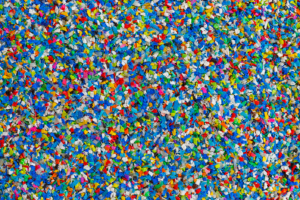Steri Candle Filters Used In Polymer Recycling
What is polymer recycling?
In the circular economy process, polymer recycling refers to the practice of collecting, processing, and reusing plastic waste (polymers) to produce new products or materials. The circular economy is a sustainable economic model that aims to minimize waste, maximize resource efficiency, and reduce the environmental impact of production and consumption.
The polymer recycling process typically involves the following steps:
- Collection: Plastic waste is collected from various sources, including households, businesses, industries, and public spaces. The collected plastic waste may include bottles, containers, packaging materials, plastic films, and more.
- Sorting: The collected plastic waste is sorted based on its type and characteristics. Different types of plastic have distinct properties, and recycling processes may vary depending on the specific polymer being recycled. Sorting is crucial to ensure that only compatible plastic types are processed together to maintain the quality of the recycled material.
- Cleaning: Once sorted, the plastic waste undergoes a cleaning process to remove any contaminants, such as labels, adhesives, food residue, or other impurities. The cleaning helps prepare the plastic for further processing.
- Shredding and Melting: After cleaning, the plastic waste is shredded into smaller pieces or melted down into a liquid state. Shredding increases the surface area and facilitates uniform melting. The melted plastic can then be formed into pellets or other shapes, making it easier to handle during reprocessing.
- Reprocessing: The shredded or melted plastic is reprocessed using various methods, such as extrusion, injection molding, or blow molding. Extrusion involves heating and shaping the plastic into continuous forms like pipes, sheets, or fibers. Injection molding injects molten plastic into molds to create products of specific shapes and sizes. Blow molding is used to create hollow products like bottles.
- Manufacturing: The reprocessed plastic is used as raw material for manufacturing new products. Recycled plastic can be incorporated into a wide range of products, including bottles, containers, bags, furniture, automotive parts, and more.
The circular economy process seeks to close the loop by incorporating recycled materials back into the production cycle, reducing the dependence on finite resources, minimizing waste, and mitigating environmental pollution. Recycling polymers aligns with these principles as it aims to transform plastic waste into valuable resources, contributing to a more sustainable and responsible approach to plastic usage.
By embracing polymer recycling within the circular economy, we can create a closed-loop system where plastic products are continually recycled and reused, reducing the pressure on natural resources, conserving energy, and promoting environmental conservation. This transition to a circular model fosters a more resilient and sustainable economy that benefits both society and the environment.
Where do Steri Candle Filters fit?
Steri Candle Filters play a crucial role in the cleaning step of polymer recycling within the circular economy processes. When polymers are dissolved in solvents during recycling, there are residual insoluble impurities left behind, such as other polymers, paper, and dyes. The purpose of the candle filter is to effectively remove these impurities, ensuring a clean and solids-free solution of the recycled polymer and solvent for further downstream processing.
Candle filters offer inherent advantages for polymer recycling processes:
- Fully Enclosed Filtration: The filters are designed for handling volatile solvents safely and meet Class 1 Div 1 requirements, providing a hermetic and secure filtration environment.
- Reliable Operation: With no moving parts, candle filters operate in a highly reliable manner and require minimal maintenance and parts replacement.
- High Surface Area: Candle filters have a high surface area to filter volume ratio, allowing for efficient throughput and long filter cycles.
Steri Technologies, a leader in polymer recycling innovation, has developed a specialized candle filter design tailored specifically for the polymer recycling process. This unique design eliminates the need for filter cloth, further improving reliability, reducing maintenance frequency, and eliminating a significant portion of operating expenses related to parts. The modified candle design also enables more aggressive cleaning options in case of process upsets. High-temperature steam, above the polymer melting point, can be used for effective cleaning in place, removing buildups that contribute to filter blinding without the need to open the filter for cleaning.
Moreover, the Steri candle filter design is suitable for high-pressure environments, capable of withstanding over 250 PSI pressure differentials. This high-pressure capability broadens the range of solvents that can be explored in the polymer recycling process, even allowing the use of liquid solvents that are gaseous at ambient pressure and temperature.
Steri Technologies’ innovative candle filter design enhances the efficiency, reliability, and adaptability of polymer recycling processes, contributing to the advancement of sustainable solutions in the industry.
